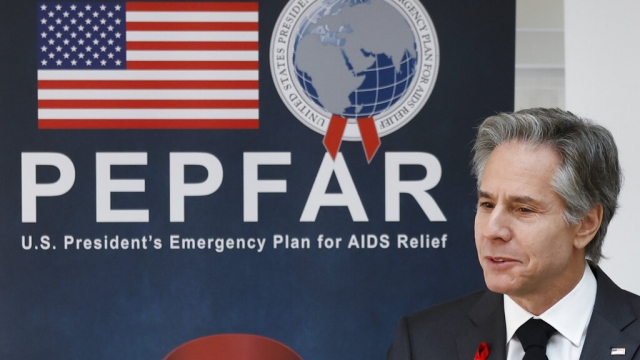In the back halls of Washington, there's a debate going on that could affect the health of tens of millions of patients with HIV across the developing world.
It's a back and forth about the future of a longstanding and highly successful U.S. effort to provide life-saving drugs overseas: PEPFAR, the President's Emergency Plan for AIDS Relief.
The struggle pits several major Christian figures and organizations against one another over one of the most controversial topics in politics: abortion. PEPFAR's roots stretch back to the George W. Bush administration.
"To meet a severe and urgent crisis abroad tonight, I propose the Emergency Plan for AIDS Relief—a work of mercy beyond all current international efforts to help the people of Africa," Bush said in a 2003 address to Congress. "This comprehensive plan will prevent 7 million new AIDS infections, treat at least two million people with life-extending drugs."
"PEPFAR is mostly focused on drug delivery. That's the main thing it does, is give people drug treatment, and it does that through local organizations on the ground, through NGO's," says Emily Belz, a reporter with Christianity Today. "But those big NGO's are often working through really small local health clinics in Africa largely, and many of them are faith-based, which is part of why evangelicals have been so interested in this program and supportive of it over the years."
SEE MORE: AIDS can be ended by 2030, UN says
Today, the program spends seven billion dollars per year and has succeeded even more than President Bush had hoped. "In the past 20 years, PEPFAR has saved 25 million lives," John N. Nkengasong, U.S. Global AIDS Coordinator, said in a recent congressional hearing. "Thanks to the generosity of the American people, PEPFAR's investments are supporting over 20 million people on life-saving treatments and have prevented HIV infections in 5.5 million babies."
Bipartisan support has been crucial for PEPFAR's long-lasting success, regardless of who has controlled Congress or the White House.
But there's a new threat to that consensus, and ironically, the threat to PEPFAR right now is coming from one of its earliest supporters, Chris Smith, a Republican in Congress from New Jersey.
Smith, a devout Catholic, is among the leading opponents of abortion in Congress and has voiced concerns about abortion being funded through the program. The "big picture concern is that it's funding abortion. The more nuanced concern is that it's funding groups that do abortions or advocate for abortions separately from U.S. funds," says Balz.
In a June letter, Smith charged that the Biden administration had politicized PEPFAR to "promote abortion on demand." The letter notes that Population Services International, an international aid organization, received almost ninety-seven million dollars in PEPFAR support in the last two years for its HIV/AIDS care. The group offers abortions among its health services and operates in Africa, Central America, and Southeast Asia.
SEE MORE: Red Cross begins accepting blood donations from more gay men
Population Services International says that its "abortion work remains separate from US government funding due to long-standing US laws and regulations."
"There's already amendments in place with every foreign aid bill that prevent direct funding or advocacy for abortion," says Balz. "But Chris Smith, one of his conditions for supporting the reauthorization of PEPFAR is that the Mexico City policy be included. And that's a policy that says that the U.S. government will not support organizations that, with their own funding, are also advocating for abortion."
The Family Research Council, a major evangelical group, is among several organizations opposed to abortion that are now urging politicians to oppose reauthorizing PEPFAR without the new restrictions on abortion. But Democrats are insisting on reauthorizing the PEPFAR legislation without any new restrictions. If the two sides can't agree, the program could lose its reauthorization, relying instead on annual funding bills.
"Reauthorization gives the program the kind of U.S. government seal of approval that this is a health program that's going to continue," says Balz. "And it means a lot for the 20 million people who are on treatment right now to know the U.S. government is saying we're going to support this program for five more years."
In July, former Senator Rick Santorum of Pennsylvania coauthored a column urging his conservative colleagues to reauthorize PEPFAR as before. "No funds can be or ever have been used to pay for abortion on demand," he wrote in the conservative publication Newsmax. He noted that if the program loses authorization, it could lose policies that conservatives previously insisted on, including an emphasis on abstinence to help prevent the spread of HIV.
It's an increasingly acrimonious fight, showing how a politicized Washington has global implications.
Trending stories at Scrippsnews.com





